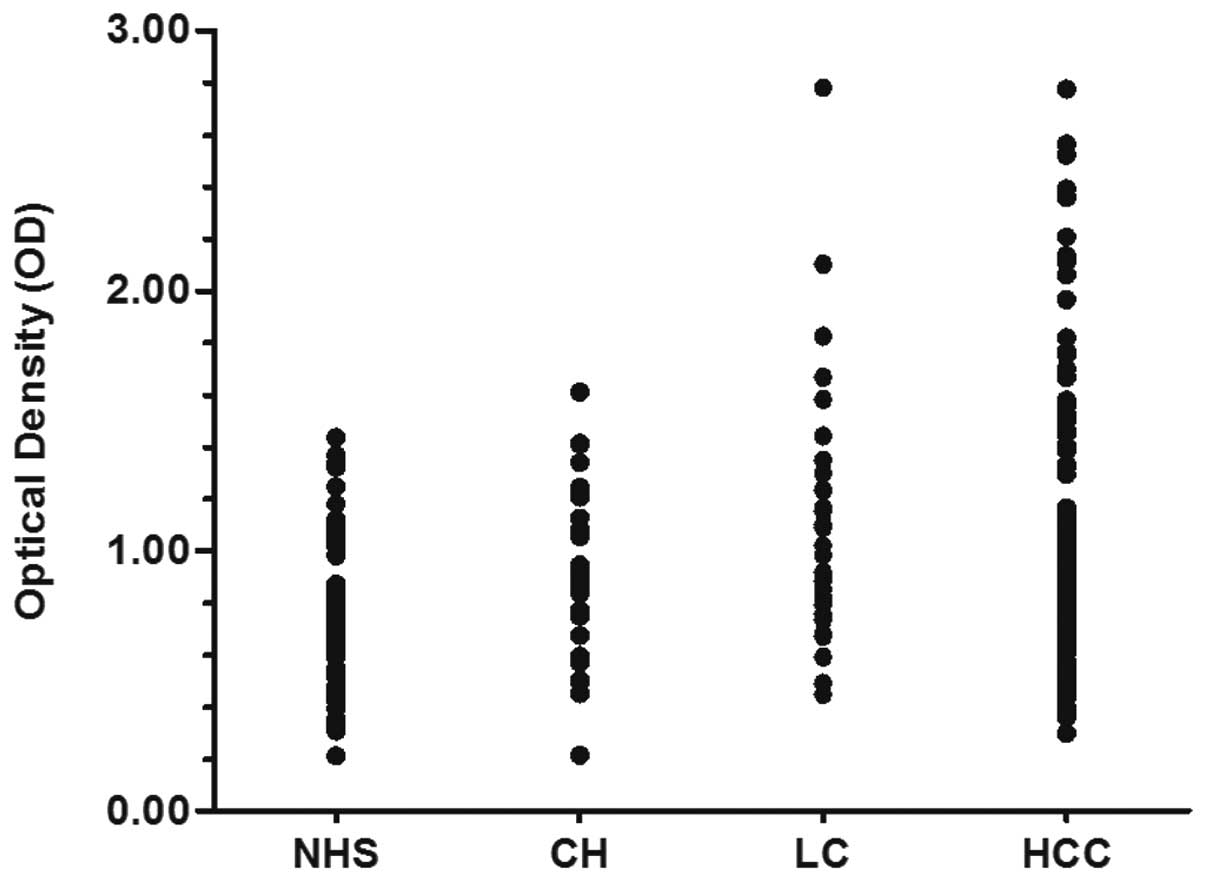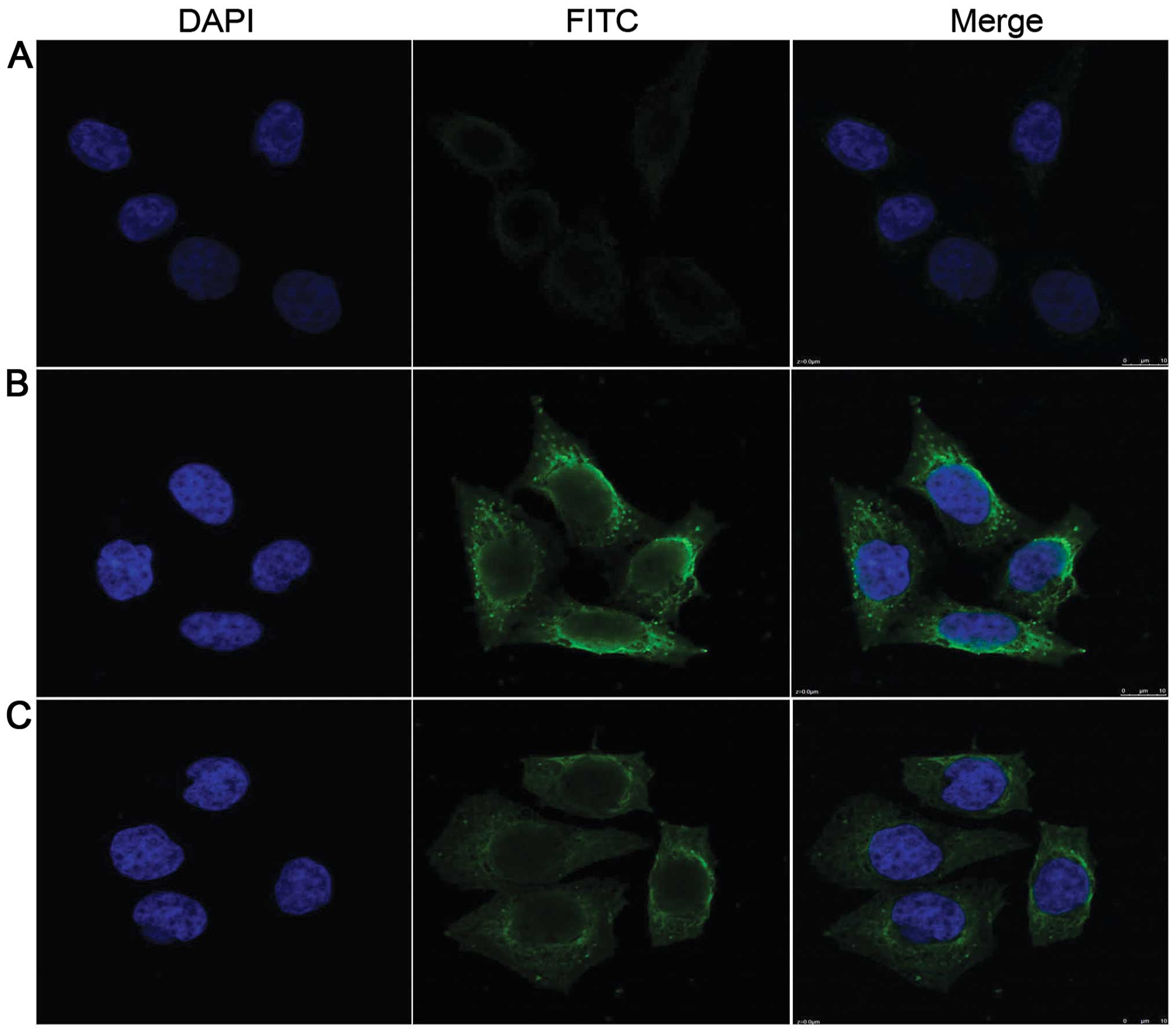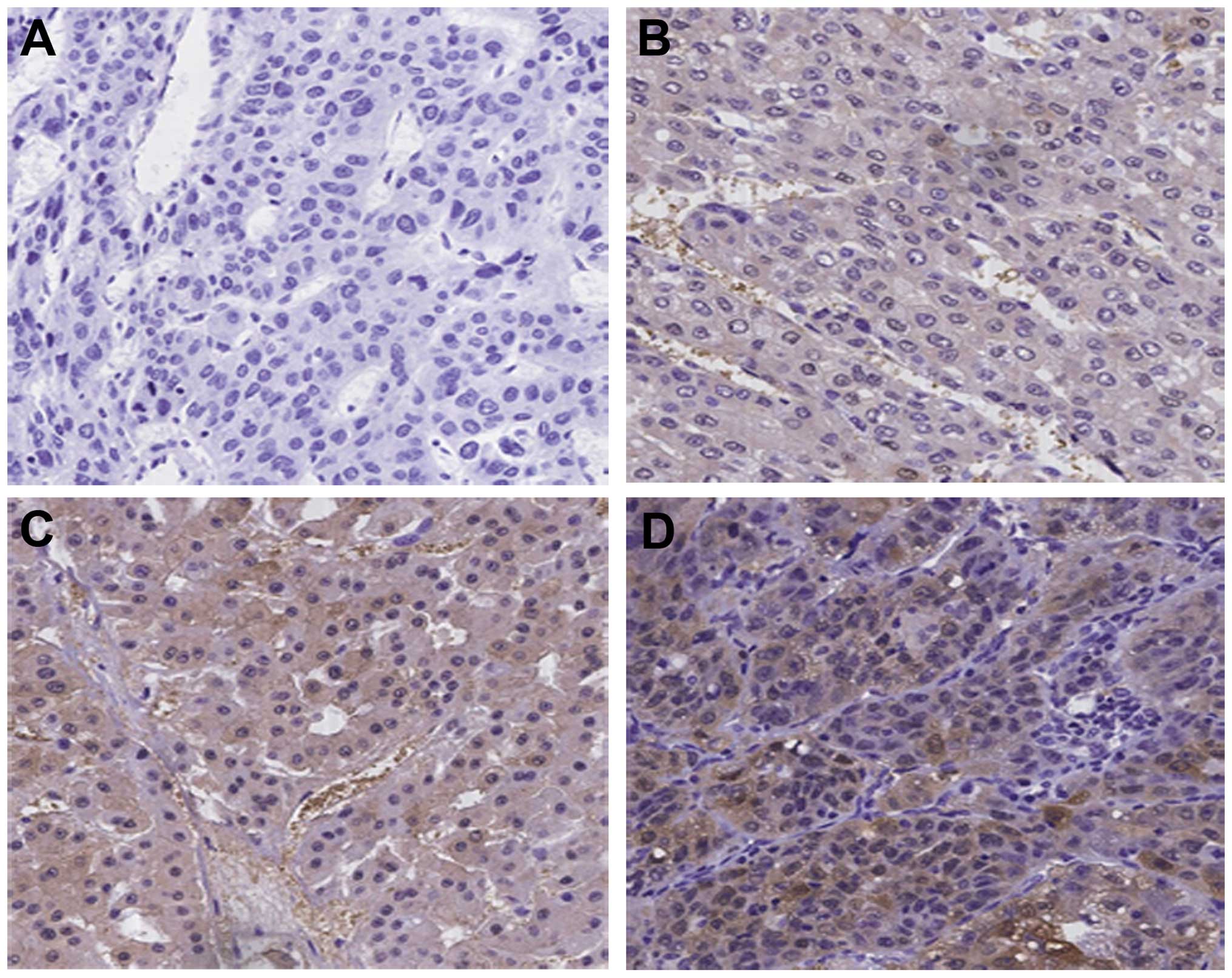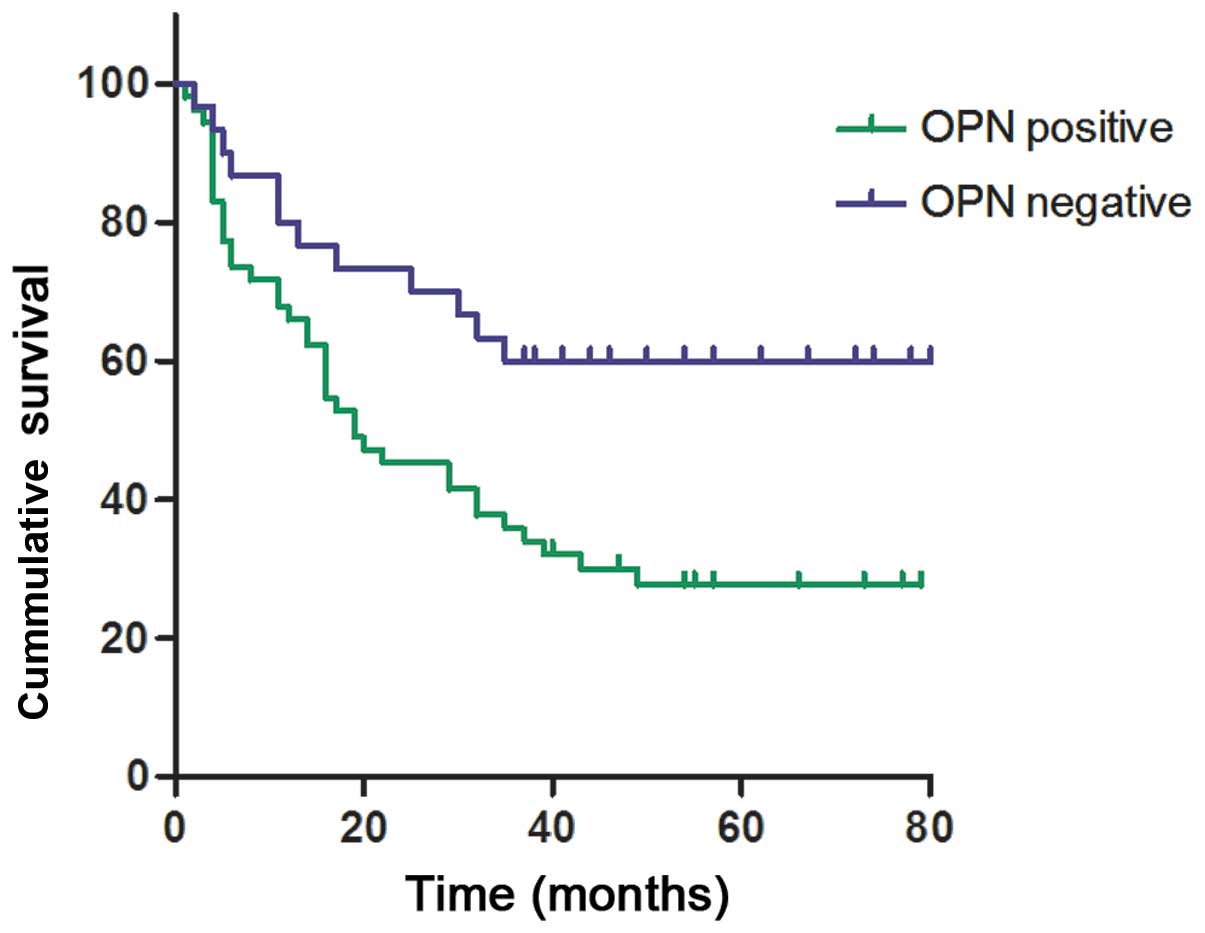|
1
|
Gomaa AI, Khan SA, Toledano MB, Waked I
and Taylor-Robinson SD: Hepatocellular carcinoma: Epidemiology,
risk factors and pathogenesis. World J Gastroenterol. 14:4300–4308.
2008. View Article : Google Scholar : PubMed/NCBI
|
|
2
|
Parikh S and Hyman D: Hepatocellular
cancer: a guide for the internist. Am J Med. 120:194–202. 2007.
View Article : Google Scholar
|
|
3
|
Behne T and Copur MS: Biomarkers for
hepatocellular carcinoma. Int J Hepatol. 2012:8590762012.
View Article : Google Scholar : PubMed/NCBI
|
|
4
|
Cheng J, Wang W, Zhang Y, et al:
Prognostic role of pre-treatment serum AFP-L3% in hepatocellular
carcinoma: systematic review and meta-analysis. PloS One.
9:e870112014.PubMed/NCBI
|
|
5
|
Chen M, Li G, Yan J, et al: Reevaluation
of glypican-3 as a serological marker for hepatocellular carcinoma.
Clin Chim Acta. 423:105–111. 2013. View Article : Google Scholar : PubMed/NCBI
|
|
6
|
Song P, Feng X, Zhang K, et al:
Perspectives on using des-gamma-carboxyprothrombin (DCP) as a serum
biomarker: facilitating early detection of hepatocellular carcinoma
in China. Hepatobiliary Surg Nutr. 2:227–231. 2013.PubMed/NCBI
|
|
7
|
Zhu Q, Liu M, Dai L, et al: Using
immunoproteomics to identify tumor-associated antigens (TAAs) as
biomarkers in cancer immunodiagnosis. Autoimmun Rev. 12:1123–1128.
2013. View Article : Google Scholar : PubMed/NCBI
|
|
8
|
Zhang Y, Ying X, Han S, et al:
Autoantibodies against insulin-like growth factor binding protein-2
as a serological biomarker in the diagnosis of lung cancer. Int J
Oncol. 42:93–100. 2013.PubMed/NCBI
|
|
9
|
Tan EM: Autoantibodies as reporters
identifying aberrant cellular mechanisms in tumorigenesis. J Clin
Invest. 108:1411–1415. 2001. View
Article : Google Scholar : PubMed/NCBI
|
|
10
|
Zhang JY, Chan EK, Peng XX and Tan EM: A
novel cytoplasmic protein with RNA-binding motifs is an autoantigen
in human hepatocellular carcinoma. J Exp Med. 189:1101–1110. 1999.
View Article : Google Scholar : PubMed/NCBI
|
|
11
|
Liaw L, Skinner MP, Raines EW, Ross R,
Cheresh DA, Schwartz SM and Giachelli CM: The adhesive and
migratory effects of osteopontin are mediated via distinct cell
surface integrins. Role of alpha v beta 3 in smooth muscle cell
migration to osteopontin in vitro. J Clin Invest. 95:713–724. 1995.
View Article : Google Scholar : PubMed/NCBI
|
|
12
|
Malyankar UM, Scatena M, Suchland KL, Yun
TJ, Clark EA and Giachelli CM: Osteoprotegerin is an alpha vbeta
3-induced, NF-kappa B-dependent survival factor for endothelial
cells. J Biol Chem. 275:20959–20962. 2000. View Article : Google Scholar : PubMed/NCBI
|
|
13
|
Chen F, Liu H, Shen Q, et al: Osteopontin:
participation in inflammation or mucosal protection in inflammatory
bowel diseases? Dig Dis Sci. 58:1569–1580. 2013. View Article : Google Scholar : PubMed/NCBI
|
|
14
|
Yang M, Ramachandran A, Yan HM, et al:
Osteopontin is an initial mediator of inflammation and liver injury
during obstructive cholestasis after bile duct ligation in mice.
Toxicol Lett. 224:186–195. 2014. View Article : Google Scholar : PubMed/NCBI
|
|
15
|
Shao JS, Sierra OL, Cohen R, et al:
Vascular calcification and aortic fibrosis: a bifunctional role for
osteopontin in diabetic arteriosclerosis. Arterioscler Thromb Vasc
Biol. 31:1821–1833. 2011. View Article : Google Scholar : PubMed/NCBI
|
|
16
|
Hwang SM, Lopez CA, Heck DE, Gardner CR,
Laskin DL, Laskin JD and Denhardt DT: Osteopontin inhibits
induction of nitric oxide synthase gene expression by inflammatory
mediators in mouse kidney epithelial cells. J Biol Chem.
269:711–715. 1994.PubMed/NCBI
|
|
17
|
Kawashima R, Mochida S, Matsui A, et al:
Expression of osteopontin in Kupffer cells and hepatic macrophages
and Stellate cells in rat liver after carbon tetrachloride
intoxication: a possible factor for macrophage migration into
hepatic necrotic areas. Biochem Biophys Res Commun. 256:527–531.
1999. View Article : Google Scholar
|
|
18
|
Hahne JC, Meyer SR, Kranke P, et al:
Studies on the role of osteopontin-1 in endometrial cancer cell
lines. Strahlenther Onkol. 189:1040–1048. 2013. View Article : Google Scholar : PubMed/NCBI
|
|
19
|
Ramachandran S, Kwon KY, Shin SJ, et al:
Regulatory role of osteopontin in malignant transformation of
endometrial cancer. Mol Biol Rep. 40:3623–3629. 2013. View Article : Google Scholar : PubMed/NCBI
|
|
20
|
Li NY, Weber CE, Mi Z, Wai PY, Cuevas BD
and Kuo PC: Osteopontin up-regulates critical
epithelial-mesenchymal transition transcription factors to induce
an aggressive breast cancer phenotype. J Am Coll Surg. 217:17–26.
2013. View Article : Google Scholar
|
|
21
|
Yu TT, Han ZG, Shan L, Tao J, Zhang T,
Yuan SF and Shen HL: Expression of osteopontin in non-small cell
lung cancer and correlative relation with microvascular density.
Asian Pac J Cancer Prev. 15:29–32. 2014. View Article : Google Scholar : PubMed/NCBI
|
|
22
|
Huang J, Pan C, Hu H, Zheng S and Ding L:
Osteopontin-enhanced hepatic metastasis of colorectal cancer cells.
PloS One. 7:e479012012. View Article : Google Scholar : PubMed/NCBI
|
|
23
|
Righi L, Bollito E, Ceppi P, et al:
Prognostic role of bone sialoprotein in clear cell renal carcinoma.
Anticancer Res. 33:2679–2687. 2013.PubMed/NCBI
|
|
24
|
Shang S, Plymoth A, Ge S, et al:
Identification of osteopontin as a novel marker for early
hepatocellular carcinoma. Hepatology. 55:483–490. 2012. View Article : Google Scholar : PubMed/NCBI
|
|
25
|
Abu El Makarem MA, Abdel-Aleem A, Ali A,
Saber R, Shatat M, Rahem DA and Sayed D: Diagnostic significance of
plasma osteopontin in hepatitis C virus-related hepatocellular
carcinoma. Ann Hepatol. 10:296–305. 2011.PubMed/NCBI
|
|
26
|
Shao Q, Ren P, Li Y, et al: Autoantibodies
against glucose-regulated protein 78 as serological diagnostic
biomarkers in hepatocellular carcinoma. Int J Oncol. 41:1061–1067.
2012.PubMed/NCBI
|
|
27
|
Xie H, Song J, Du R, et al: Prognostic
significance of osteopontin in hepatitis B virus-related
hepatocellular carcinoma. Dig liver Dis. 39:167–172. 2007.
View Article : Google Scholar : PubMed/NCBI
|
|
28
|
Ramaiah SK and Rittling S:
Pathophysiological role of osteopontin in hepatic inflammation,
toxicity, and cancer. Toxicol Sci. 103:4–13. 2008. View Article : Google Scholar : PubMed/NCBI
|
|
29
|
O’Regan AW, Nau GJ, Chupp GL and Berman
JS: Osteopontin (Eta-1) in cell-mediated immunity: teaching an old
dog new tricks. Immunol Today. 21:475–478. 2000.PubMed/NCBI
|
|
30
|
Shinohara ML, Jansson M, Hwang ES, Werneck
MB, Glimcher LH and Cantor H: T-bet-dependent expression of
osteopontin contributes to T cell polarization. Proc Natl Acad Sci
USA. 102:17101–17106. 2005. View Article : Google Scholar : PubMed/NCBI
|
|
31
|
Denhardt DT, Noda M, O’Regan AW, Pavlin D
and Berman JS: Osteopontin as a means to cope with environmental
insults: regulation of inflammation, tissue remodeling, and cell
survival. J Clin Invest. 107:1055–1061. 2001. View Article : Google Scholar : PubMed/NCBI
|
|
32
|
Cao DX, Li ZJ, Jiang XO, et al:
Osteopontin as potential biomarker and therapeutic target in
gastric and liver cancers. World J Gastroenterol. 18:3923–3930.
2012. View Article : Google Scholar : PubMed/NCBI
|
|
33
|
Sun BS, Dong QZ, Ye QH, et al:
Lentiviral-mediated miRNA against osteopontin suppresses tumor
growth and metastasis of human hepatocellular carcinoma.
Hepatology. 48:1834–1842. 2008. View Article : Google Scholar : PubMed/NCBI
|
|
34
|
Philip S and Kundu GC: Osteopontin induces
nuclear factor kappa B-mediated promatrix metalloproteinase-2
activation through I kappa B alpha/IKK signaling pathways, and
curcumin (diferulolylmethane) down-regulates these pathways. J Biol
Chem. 278:14487–14497. 2003. View Article : Google Scholar
|
|
35
|
Tilli TM, Silva EA, Matos LC, et al:
Osteopontin is a tumor autoantigen in prostate cancer patients.
Oncol Lett. 2:109–114. 2011.PubMed/NCBI
|
|
36
|
Sakata M, Tsuruha JI, Masuko-Hongo K, et
al: Autoantibodies to osteopontin in patients with osteoarthritis
and rheumatoid arthritis. J Rheumatol. 28:1492–1495.
2001.PubMed/NCBI
|



















